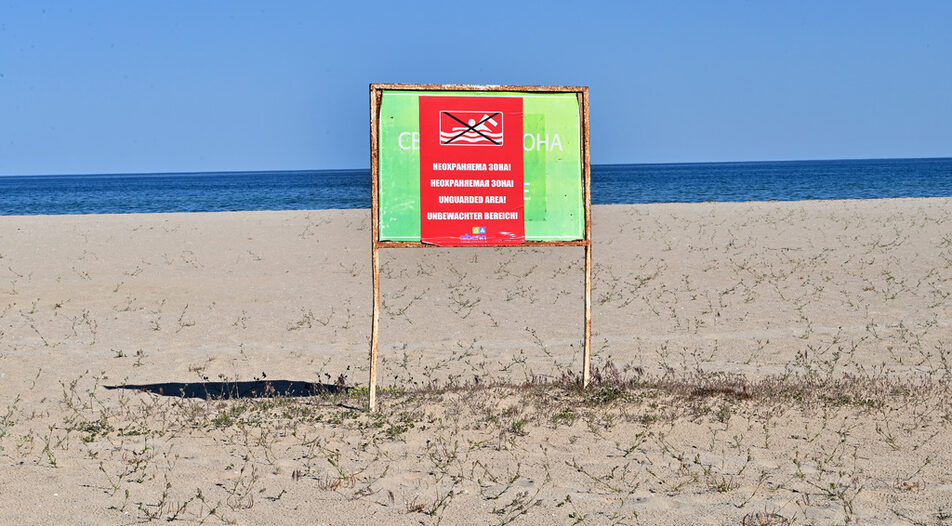So how do you dismantle a captured state? That is the question the new Bulgarian government is currently trying to resolve. In the US, they call it "the deep state" - meaning institutions and paralysis that prevent even the wildest figure (say, Donald Trump - remember him?) from unilaterally changing the course of a country.
Yet in Bulgaria, the deep state is actually not so deep and far from devoted to the public good. It consists of political appointees in various ministries, agencies and regulators - so-called experts - whose role is to ensure that commands from above are implemented and that institutions are faithful not to the public, but to whoever manipulates hidden levers. This cadre has been growing for the past 12 years of GERB rule and will not be easy to dismantle - in some places, just like cancer, it has contaminated most of the institution.
Some of that can be cured through new appointments and sackings. Some of it can't. Take for example the most blatant case last week: the secret services. The heads of the three services that were called to the Prime Minister's office - counterintelligence (DANS), intelligence and the agency for technical operations (wiretapping and stuff) - didn't show up. Two of the three were on (an obviously) coordinated leave of absence until September: just in time to skip the caretaker government. The PM requested their resignations and didn't receive them.
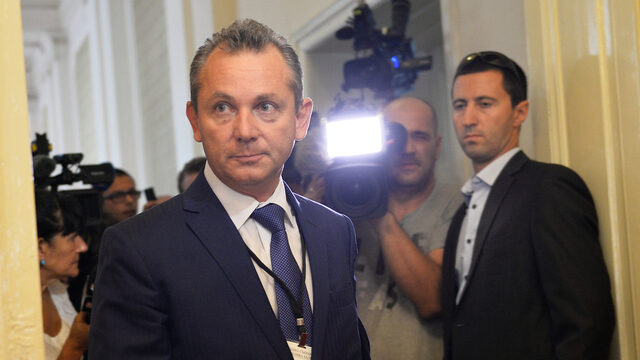
Technically, they are not obliged to do so. The law provides a limited possibility for their removal. Yet after GERB lost the ability to govern, the protests last year, and the calls for "restart of statehood", to deny the caretaker government the ability to appoint new people in charge of the state's deadliest weapon was seen as a declaration of independence.
In the end, DANS head Dimitar Georgiev resigned, although he claimed that the government was taking action against DANS because of "its operations to dismantle Russian networks" in Bulgaria. This is laughable: it took DANS several years and many journalistic investigations to even notice that the Russians had sabotaged arms depots in the country and had tried to poison an arms dealer.
Yet last week, an opposition leader claimed that many politicians opposed to GERB had been wiretapped by DANS. If that's true, Georgiev's resignation won't fix a system that is thoroughly twisted towards serving one party's interests, instead of the State.
And it is going to take a lot more than a caretaker government to dismantle such a structure.
POLITICS
As were the services, so was the bank
While the interior minister was struggling with the secret arm of the State, the economic minister was trying to find the economic one. A week after Kiril Petkov announced that the state Bank for Development had devoted half of its credit portfolio to only 8 companies, most of them controlled by Delyan Peevski, he tried to summon the Supervisory board of the bank. Only one of the three members showed up.The others sent a short note, decrying what was happening as "a circus". Petkov dismissed them on the spot, yet this leaves the bank without Supervision.
It would have been amusing to watch this if it didn't concern almost a billion leva (500 million euro) of taxpayers' money.
It's raining bureaucrats
The changes continue throughout the administration: this week saw the dismissal of those leading the Road Agency. It was entirely expected: the main procurement in the country is focused in the Agency and it is a public secret that every major bid it announced was ... let's say dubious.
"The commies are coming!"
The seemingly endless string of dismissals of GERB figureheads by the caretaker government was not welcomed by former Prime Minister Boyko Borissov. Typically, he streamed on FB decrying it as a "coup" that was "killing off the elite of the nation". Borissov was drawing a comparison with the so-called communist-led People's court from 1945 that illegitimately eliminated the cream of the Bulgarian pre-war intelligentsia and political leaders.
This went beyond bad taste: to compare the dismissal of a couple of dozen questionable heads of agencies and deputy ministers to the 3,000 death sentences and 2,000 life sentences of the ad-hoc tribunal of 1945 is a clear sign that Borissov is seriously rattled.
Radev's week: North Macedonia, Brussels, the Pope
In the meantime Borissov's nemesis - President Rumen Radev took over at the helm of foreign policy. Radev held two meetings with North Macedonian officials and then went to Brussels for an urgent heads-of-state meeting devoted to Russia and Belarus.
North Macedonia President Stevo Pendarovski told the media that his Bulgarian colleague "uses a completely different rhetoric" from others in Sofia, raising hopes for a new dialogue concerning EU negotiations. Mr Radev, said Pendarovski, did not try to offend the Macedonians and spoke "in a cultured tone," unlike members of the former cabinet like ex-Defense Minister Krassimir Karakachanov or Foreign Minister Ekaterina Zaharieva. Maybe, among other things, Mr Radev will dethrone Mr Borissov as the "good guy" of Sofia-Skopje relations, although it is quite unlikely Bulgaria will give ground under this government.
Then Radev showed up for the EU meeting, where he didn't diverge from the tough line towards Belarus. And then he flew to Rome to meet Pope Francis for the annual celebration of the Cyrilic alphabet and its creators - St. Cyril and Methodi.
This hits at the heart of Borissov's boasts about being the official face of Bulgaria abroad (to add insult to injury, Radev also speaks excellent English - unlike Borissov!)
One woman to rule the left
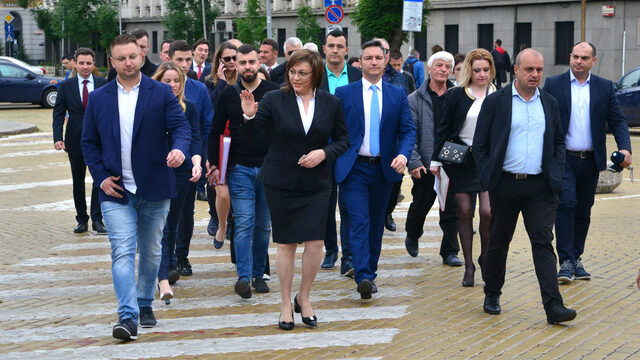
Talking about the "communists," their descendants from BSP seem half-hearted in their attempt to adjust their pre-election strategy in order to avoid repeating their dismal performance from 4 April.
The Socialists extended their hand to other factions on the "left" in order to make a grand coalition but not everybody was invited. Maya Manolova, one of the former spearheads of BSP who created her own "Stand up, Bulgaria!" faction, did not get an invitation at all, while another signature former BSP cadre, lawyer Tatyana Doncheva, met Socialist leader Kornelia Ninova, but refused her offer.
Apparently, Ms Ninova was not willing to acquiesce to Ms Doncheva's demand to change the name of the coalition in order to include D-21 (the name of the latter's faction) and make her a co-leader on equal terms. Apparently, there is room for only one strong(wo)man on the left side of the spectrum.
75 people in an hour
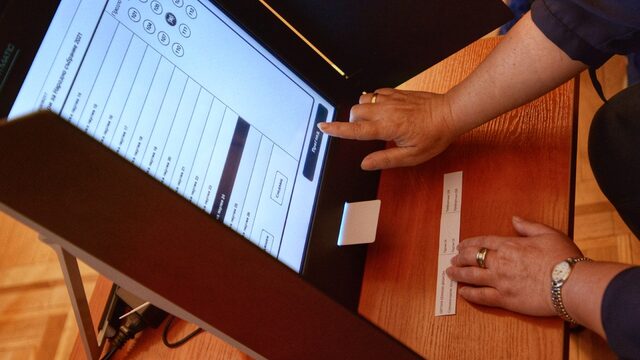
That's the impressive test result by the new Central Electoral Committee after they tried the machine voting. Given that this means less than 1 minute per person, the result is not really representative of how the real voting will go, but still seems a lot faster than the paper ballot.
And speaking of elections, some places to keep in mind
Over 60 percent of votes in polling stations determined to be "high risk" - in terms of being suspected of being a controlled and corporate vote - go to GERB and the Turkish MRF, according to research by the Anti-corruption Fund.
The experts from the watchdog ploughed through tons of data to find polling stations with atypically high voter turnout, a strangely high result for the winning party and abnormal change of preferences compared to previous elections to determine the 1,500 stations (out of 12,500 in total) where such patterns exist.
Unsurprisingly, MRF and GERB vied for this dubious honor, with the ethnic party getting 30 percent of the vote in these sections (for comparison - the party got just over 10 percent of the total vote) and GERB receiving 31 percent there. Of course, it is hard to prove how much of this vote is actually "purchased," but the tendency is clear.
ECONOMY
Bombs will keep blowing in the state-controlled energy sector
The new minister Andrey Zhivkov painted a bleak picture of the sector he inherited in his first press-conference. Bulgarian Energy Holding takes on huge debts to delay problems and cover its huge deficiencies. The National Electricity Company has no idea how to cover its own debts, "Maritza Iztok 2" power plant is in a critical financial condition, "Bulgartransgaz" is indebted to the tune of billions euros of debts and "TurkStream" is nowhere near the profitability it promised. Even the state-controlled gas operator and monopoly Bulgargaz has issues with payments to Gazprom.
Zhivkov will only be in the job for 2 months so this doesn't seem to be his problem, but it's obvious that someone will have to start fixing this mess.
1.46 billion leva or almost 750 million euro
That's what the state-owned "Avtomagistrali" received from the state last year. The reason - to build "Hemus" highway. Yet, as we've already discovered, it acts more like a hub for hidden payments towards private companies. 90% of this money went to private builders who get chosen on unclear criteria and without transparency.
BUSINESS
Venture capital Morningside Hill
The fund invested 6 million euro in 6 companies: Gastronom.bg, Neurorehabilitation Robotics, Univalent, Ensk.ai, Threeding and AQUILE. The fund managers say they've invested around a million in each. Morningside Hill has 38 million euro from the state-owned Fund of funds and is obliged to make at least 26 investments, which means it has 18 left.
Delivery
GlovoThe Spanish platform is storming Central and Eastern European markets, by acquiring a whole range of companies. In Bulgaria and Romania it is buying Foodpanda, and 2 other companies in 4 countries in the region. The whole deal is valued at 170 million euro.
Food
Mondelez and ChipitaMondelez International is buying the Greek producer of baked goods for about 2 billion dollars. This will create a new leader in the sweets market in Bulgaria. The new company will have a combined revenue of about 180 million euro and will be in front of "Nestle".
Pharmaceuticals
Sopharma One of the largest public companies in the country decided on 21 May to raise capital through the issuance of up to 44 932 633 warrants at an issue price and strike price of BGN 0.28 and BGN 4.13, respectively. The issue will be considered successful if at least 22 466 317 warrants are subscribed and paid. The warrants would be exercisable within 3 years. That means the company is looking to get 12.6 mln leva or 6 million euro from the market.
ENERGY
The nuclear problem of the Bulgarian energy exchange
Anytime the Nuclear power plant "Kozloduy" goes into repairs, the price of electricity in Bulgaria jumps. And this has started to happen lately with disturbing frequency. Last week there was a malfunction in a pump in the non-nuclear part of the facility and one of the reactors was partially shut down. It took it several days to reach full capacity again. At the same time the other reactor is shut down for maintenance. This has led to a record electricity price on the market: Bulgaria and the connected market of Greece were paying 82.4 euro per Mwh this week which is one of the highest prices in Europe.
WATCH OUT FOR
People:
Vladi Kalinov
The ex-chief of Sofia's construction control has become the head of National construction control, which is an interesting move, given his scandalous reputation and the fact that he left the municipality under the shadow of a scandal.
Nasko Sirakov
The owner of "Levski" football club announced a big new mysterious investor will come to save the club from bankruptcy. Given the slow and tight pace of foreign investments in the country recently, it is rather dubious to expect someone to spend tens of millions of euros on a football club.
Places:
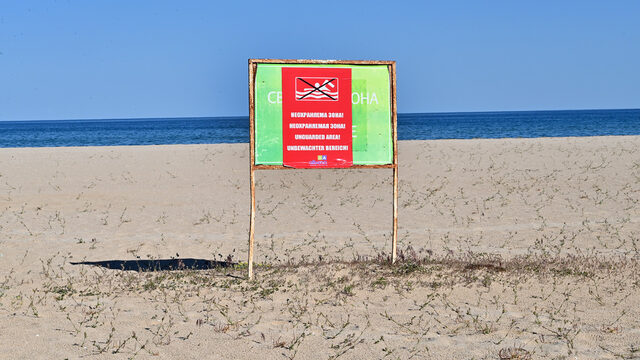
The seaside
Good weather, empty beaches: this is what you'll find at least until the end of June, after it was announced that flights with British and Russian tourists will not now arrive until the beginning of July.
So how do you dismantle a captured state? That is the question the new Bulgarian government is currently trying to resolve. In the US, they call it "the deep state" - meaning institutions and paralysis that prevent even the wildest figure (say, Donald Trump - remember him?) from unilaterally changing the course of a country.
Yet in Bulgaria, the deep state is actually not so deep and far from devoted to the public good. It consists of political appointees in various ministries, agencies and regulators - so-called experts - whose role is to ensure that commands from above are implemented and that institutions are faithful not to the public, but to whoever manipulates hidden levers. This cadre has been growing for the past 12 years of GERB rule and will not be easy to dismantle - in some places, just like cancer, it has contaminated most of the institution.








